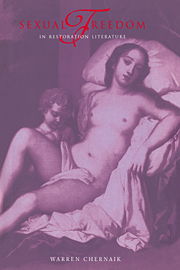Book contents
- Frontmatter
- Contents
- Acknowledgements
- Introduction: the imperfect enjoyment
- 1 Hobbes and the libertines
- 2 The tyranny of desire: sex and politics in Rochester
- 3 Absent from thee
- 4 Playing trick for trick: domestic rebellion and the female libertine
- 5 My masculine part: Aphra Behn and the androgynous imagination
- Conclusion
- Notes
- Index
Introduction: the imperfect enjoyment
Published online by Cambridge University Press: 04 September 2009
- Frontmatter
- Contents
- Acknowledgements
- Introduction: the imperfect enjoyment
- 1 Hobbes and the libertines
- 2 The tyranny of desire: sex and politics in Rochester
- 3 Absent from thee
- 4 Playing trick for trick: domestic rebellion and the female libertine
- 5 My masculine part: Aphra Behn and the androgynous imagination
- Conclusion
- Notes
- Index
Summary
This is the monstruosity in love, lady, that the will is infinite, and the execution confined; that the desire is boundless, and the act a slave to limit.
(Troilus and Cressida, iii.ii.79–81)How Blest was the Created State
Of Man and Woman, e're they fell,
Compar'd to our unhappy Fate;
We need not fear another Hell.
(The Fall, 1–4)Libertinism embodies a dream of human freedom, recognised from the outset both as infinitely desirable and as unattainable, a magical power enabling one to overcome a sense of alienation and helplessness. The appeal of transgressive libertinism is perhaps best embodied in the problematical figure of Don Juan, trickster, rebel, servant of the phallus and of the ruthless amoral will, demanding a freedom which enslaves oneself or others. Mozart's Don Giovanni, like other libertine heroes, exploits a deep ambivalence in his victims and in the audience, embodying their secret unacted desires, lulling moral judgement to sleep.
With nothing to rebel against, no taboos to be transgressed, blasphemy would lose its power to shock. It can be argued that society creates its rebels, and that limited toleration and eventual punishment of dissenters from the established order of family, church and state serve as effective instruments of social control. The youthful libertine, for all his vaunted independence, is acting out his part in a described Oedipal scenario, and must inevitably define himself in terms of the perceived norm he is rebelling against.
- Type
- Chapter
- Information
- Sexual Freedom in Restoration Literature , pp. 1 - 21Publisher: Cambridge University PressPrint publication year: 1995



